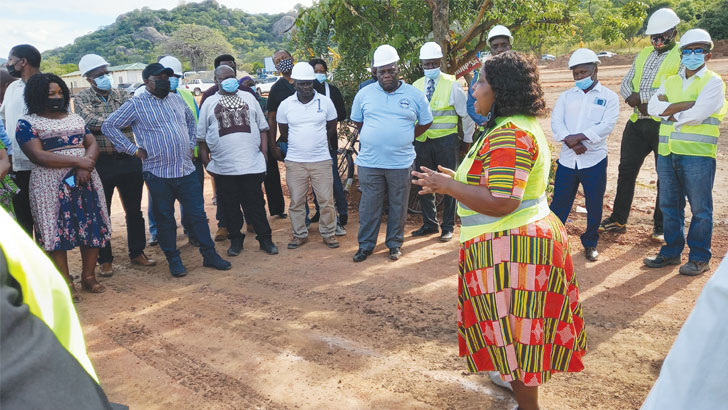Water project set to bring socio-economic benefits
The provision of potable water through the extension of $14.3 million (about K11 billion) Mangochi Potable Water Supply Project means women such as Emily Mkumba will now have access to safe water from a tap close to her home
Once completed, the project has the potential of spurring rapid socio-economic development and bring positive trickle-down effects in Mangochi District and the surrounding areas.

The project will also connect hospitality establishments along the 85-kilometre stretch from Bishop’s House in Mangochi to Mtakataka Turn-off in Monkey Bay.
Mkumba, 63, who comes from Nkhudzi Village, which is close to Lake Malawi—the fifth world’s largest fresh water lake by volume—has not had access to potable water.
“We have difficulties to draw water from Lake Malawi. The water is sometimes muddy.
“Besides that, water from boreholes is salty. We are happy that once the project is finished, we will have potable water and this will attract visitors here,” she says, with a beaming smile on her face.
The project, one of the biggest to be undertaken by Southern Region Water Board (SRWB), which has also courted controversy from conservationists such as Lake Shepherd, is expected to benefit 92 847 people in Mangochi.
According to the project outline, water purification plant will have a capacity of 15 400 cubic metres per day, with distribution network totalling 85 kilometres. The project will enable the construction of 15 communal water points to benefit poor people and also supply 10 000 pre-paid water meters.
SRWB, the implementer of the project, says it is on course to meet the deadline of July 2022.
SRWB prepared feasibility and preliminary design report to be used as a basis for detailed designs and construction of the project under Engineering Procurement and Construction.
Speaking during a recent tour of the project site, SRWB acting director of infrastructure development Engineer Jacqueline Dias said preliminary works on the project started on February 1 this year.
“As a board, we realise that water is life and without water, there can be no development in any area. The project is on course and the contractor has already mobilised equipment,” she said.
Dias said under the existing water supply system, lakeshore areas and its surroundings were not covered.
Site agent for Alghanim and Plem Construction joint venture Selvakumar Chinnin echoed the sentiments by SRWB, assuring that the project will be completed within the deadline.
Already, the project is benefiting people in the area in terms of jobs.
“We have skilled and non-skilled labour. Already, we have employed 100 people from the area and as the project proceeds, we expect to employ more than 500 people,” he said.
Group village head Mwanyama agrees with the people in his area, especially women such as Emily Mkumba that the project is beneficial.
“People in my area have been drinking water from unprotected sources which brings a lot of diseases,” he said. We think the provision of potable water will ensure that people in my area have healthy lives,” he said.
The water project covers two constituencies—Mangochi Monkey Bay whose lawmaker is Ralph Jooma and Mangochi Central represented by Victoria Kingstone.
In an interview, Jooma said despite having Lake Malawi in the district, the challenges of potable water are real.
“Water from the lake is not safe. Besides that, water from boreholes is salty because the salinity in the area is high,” he said.
Kingstone, on her part, said the project will bring affordable water, observing that water from kiosk is expensive.
In July, SRWB conducted public hearings for the project’s Environmental and Social Impact Assessement (Esia) report in Mangochi and Lilongwe.
The public hearings followed the preparation and submission of the Esia report for the project by SRWB to Malawi Environmental Protection Agency (Mepa), which halted the project in mid-May largely due to concerns on the lack of Esia.
Mepa acting director general Tawonga Mbale Luka said recently in Mangochi that the public hearings were necessary to enable people to provide their input on the project.
“These public hearing are a chance to provide views and inputs to be incorporated before the project starts,” she said.
On his part, SRWB board chairperson Ibrahim Matola said the project is huge in terms of the number of people it will benefit and its multiplier effects.
“The project has positive multiplier effects in terms of number of people to benefit, jobs to be created and attracting tourists to the lakeshore district of Mangochi. The project will supply potable water to all the hotels and lodges,” he said. The project is being financed by Kuwait Fund for Arab Economic Development





